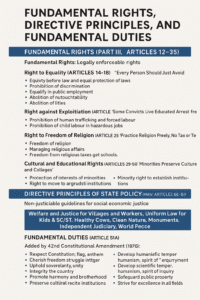📘 Fundamental Rights, Directive Principles, and Fundamental Duties – Complete UPSC Guide
🔷 Introduction
The Indian Constitution, through its Preamble, Fundamental Rights, Directive Principles of State Policy (DPSPs), and Fundamental Duties, aims to establish a just and equitable society. These features reflect the soul of the Constitution and are essential for any UPSC aspirant to master.
1. Right to Equality (Articles 14–18)
-
Equal Protection & Equality Before Law (Art. 14): Every person is treated equally before the law.
-
No Discrimination (Art. 15): The State cannot discriminate based on religion, race, caste, sex, or birthplace.
-
Equal Employment Opportunities (Art. 16): All citizens have equal access to public employment.
-
Abolition of Untouchability (Art. 17): Declares untouchability a punishable offense.
-
End of Titles (Art. 18): Prohibits awarding of titles except academic and military distinctions.
2. Right to Freedom (Articles 19–22)
-
Six Freedoms (Art. 19): Citizens enjoy freedom of speech, assembly, association, movement, residence, and profession.
-
Protection in Criminal Laws (Art. 20): Safeguards against arbitrary conviction.
-
Right to Life & Liberty (Art. 21): No one can be deprived of life or liberty except by law.
-
Free Elementary Education (Art. 21A): Education is a right for all children aged 6–14.
-
Safeguards Against Detention (Art. 22): Rights of arrested individuals, especially in preventive detention cases.
3. Right Against Exploitation (Articles 23–24)
-
Ban on Human Trafficking & Forced Labor (Art. 23)
-
Child Labor Prohibited (Art. 24): No child under 14 to work in factories or hazardous jobs.
4. Right to Freedom of Religion (Articles 25–28)
-
Religious Freedom (Art. 25): Practice, profess, and propagate any religion.
-
Manage Religious Institutions (Art. 26)
-
No Religious Tax (Art. 27)
-
Freedom from Religious Instruction (Art. 28): In certain educational institutions.
5. Cultural & Educational Rights (Articles 29–30)
-
Protect Minority Culture (Art. 29)
-
Minority Educational Rights (Art. 30): Establish and manage their own institutions.
6. Right to Constitutional Remedies (Article 32)
-
Supreme Court Access: Citizens can directly approach the SC for enforcement of their rights via writs like:
-
Habeas Corpus, Mandamus, Prohibition, Certiorari, Quo Warranto.
-
📌 Rights Exclusive to Citizens
-
Protection against discrimination (Art. 15)
-
Equal opportunity in public jobs (Art. 16)
-
All six freedoms (Art. 19)
-
Minority education rights (Art. 30)
🌐 Rights for Citizens & Foreigners (Except Enemy Aliens)
-
Equality before law (Art. 14)
-
Safeguards in criminal cases (Art. 20)
-
Right to life and liberty (Art. 21)
-
Free elementary education (Art. 21A)
-
Protection against detention (Art. 22)
-
Anti-trafficking and child labor (Arts. 23–24)
-
Religious freedoms (Arts. 25–28)

📜 Directive Principles of State Policy (Part IV, Articles 36–51)
DPSPs are non-justiciable guidelines for the State to ensure social and economic justice. Inspired by the Irish Constitution.
🔹 Key Directives:
-
Article 38: Promote welfare of people
-
Article 39: Equal livelihood, gender equality, child protection
-
Article 39A: Equal justice and free legal aid
-
Article 40: Organisation of village panchayats
-
Articles 41–43B: Right to work, maternity relief, living wage, promotion of co-operatives
-
Article 44: Uniform Civil Code (UCC)
-
Article 45: Early childhood education
-
Article 46: Promotion of education and interests of SCs/STs
-
Article 47: Duty to improve nutrition and public health
-
Article 48: Organisation of agriculture and animal husbandry
-
Article 48A: Protection of environment and forests
-
Article 49: Protection of monuments and heritage
-
Article 50: Separation of judiciary from executive
-
Article 51: Promotion of international peace and security
🧠 Mnemonic:
“Welfare and Justice for Villages and Workers, Uniform Law for Kids & SC/ST, Healthy Cows, Clean Nature, Monuments, Independent Judiciary, World Peace”
Fundamental Duties (Article 51A)
Added by the 42nd Constitutional Amendment (1976), inspired by the USSR. These duties are moral obligations of every citizen.
🔹 Eleven Duties Include:
-
Respect the Constitution, national flag, and anthem
-
Cherish noble ideals of the freedom struggle
-
Uphold sovereignty, unity, and integrity
-
Defend the country and render national service
-
Promote harmony and brotherhood
-
Preserve rich heritage of culture
-
Protect and improve the natural environment
-
Develop scientific temper, humanism, and spirit of inquiry
-
Safeguard public property
-
Strive for excellence in all fields
-
Provide education to children aged 6–14 (added by 86th Amendment)
🧠 Mnemonic:
“Respect Freedom, Unite & Defend, Harmonise Culture, Protect Environment, Be Scientific, Secure Public Property, Educate”
✅ Conclusion
Mastering the Fundamental Rights (Articles 12–35), Directive Principles (Articles 36–51), and Fundamental Duties (Article 51A) is vital for cracking UPSC exams. Mnemonics simplify memorization and help in quick revision for both Prelims and Mains.